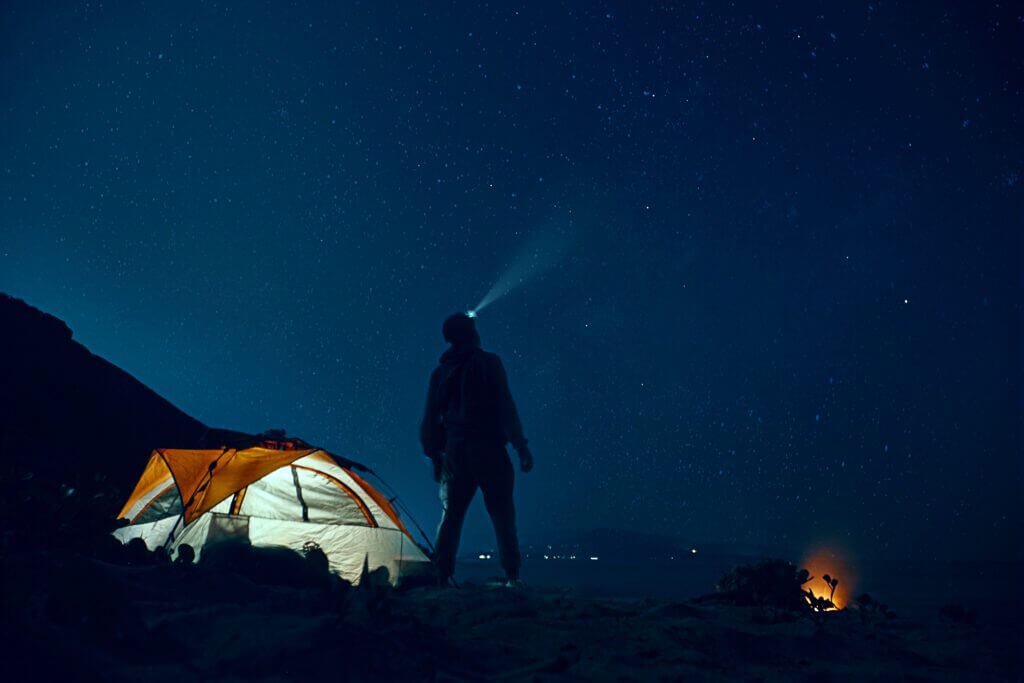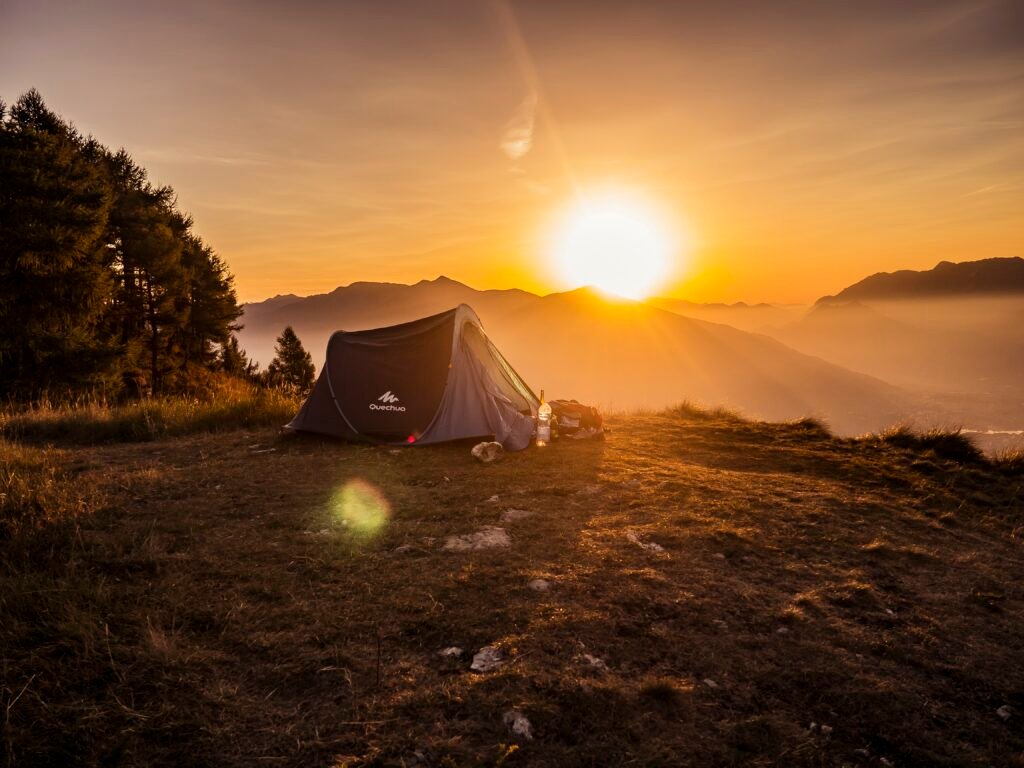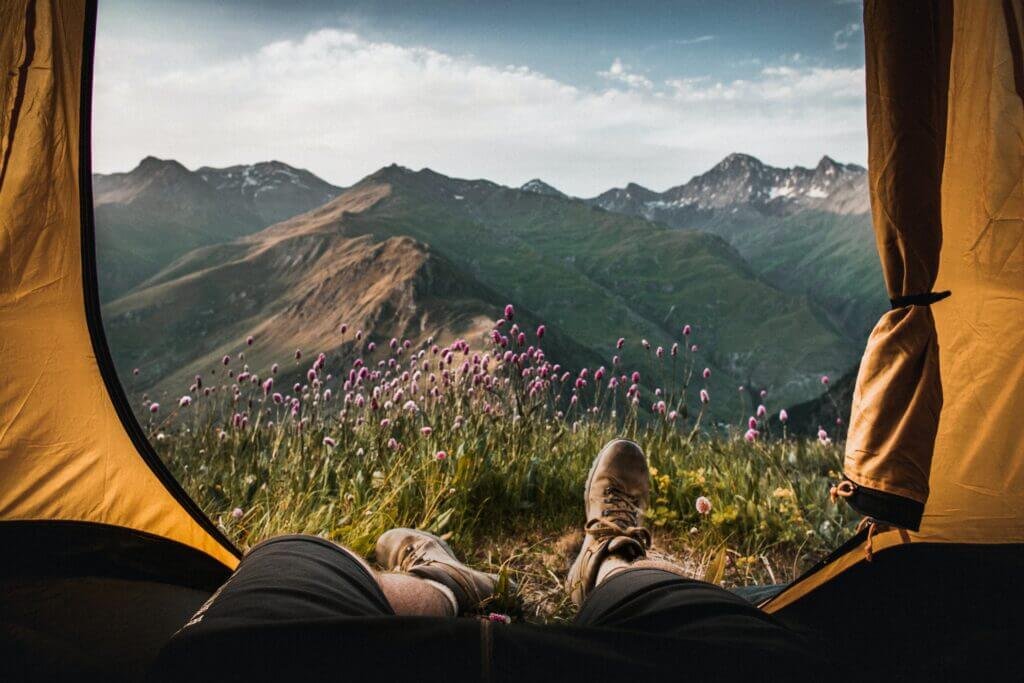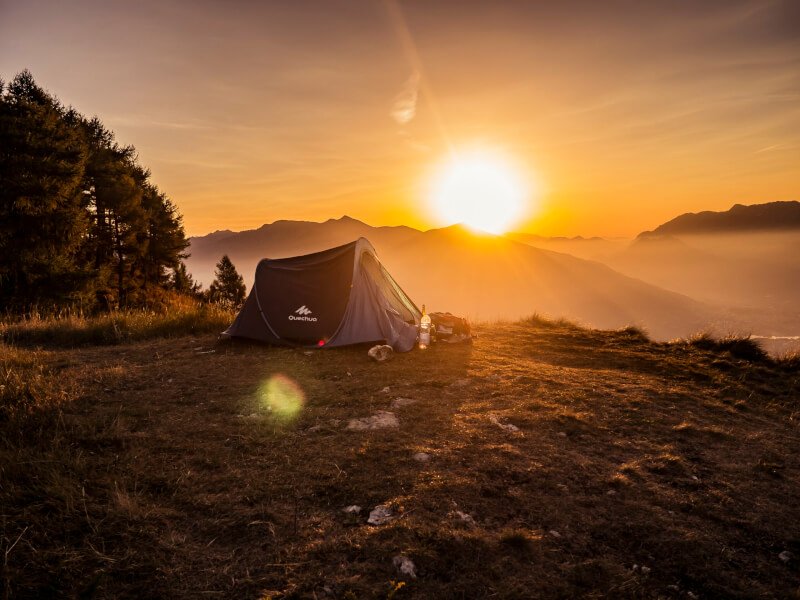Are you a beginner in the world of camping? If so, you’ve come to the right place! In this article, we will share some of the best camping hacks and tips that will help make your outdoor adventure as smooth and enjoyable as possible. Whether you’re struggling with tent setup, cooking outdoors, or staying organized, we’ve got you covered. So grab your camping gear and get ready to embark on an unforgettable journey into the great outdoors!

Choosing the Right Campsite
Location
When choosing a campsite, the first thing you should consider is the location. Look for a campsite that is easily accessible and not too far away from your home. You don’t want to spend too much time traveling to your campsite, especially if you are a beginner. Additionally, consider the surroundings of the campsite. Is it near a lake, river, or hiking trails? Choosing a campsite near natural features can enhance your outdoor experience.
Terrain and Level Ground
Another important factor to consider when choosing a campsite is the terrain and level ground. Look for a campsite that is on level ground, as it will make setting up your tent and arranging your campsite much easier. Avoid areas with rocky or uneven surfaces, as they can be uncomfortable to sleep on and may cause discomfort throughout your camping trip.
Availability of Basic Amenities
While camping is often associated with disconnecting from modern conveniences, having access to basic amenities can make your camping trip more enjoyable. Look for a campsite that offers access to clean water, bathrooms, and garbage disposal facilities. These amenities can come in handy, especially if you are a beginner and not yet accustomed to the primitive camping experience.
Essential Gear and Equipment
Sleeping Gear
When it comes to sleeping gear, a comfortable and appropriate sleeping bag should be your priority. Choose a sleeping bag that suits the climate and weather conditions of your camping destination. Additionally, invest in a sleeping pad or mattress to provide insulation and cushioning for a better night’s sleep. This will help you stay warm and comfortable during your camping trip.
Cooking Gear
Having the right cooking gear is essential for enjoying delicious meals at your campsite. Invest in a portable stove or campfire grill, as well as cookware and utensils specifically designed for camping. Don’t forget to pack a cooler for storing perishable items and consider bringing a camping coffee maker for your daily caffeine fix.
Lighting
Proper lighting is crucial for a safe and enjoyable camping experience. Pack a combination of flashlights, lanterns, and headlamps to illuminate your campsite during the dark hours. Solar-powered or battery-operated options are ideal as they are environmentally friendly and provide long-lasting light.
Clothing and Footwear
When it comes to clothing and footwear, think layers and consider the weather conditions of your camping destination. Pack lightweight, moisture-wicking clothing for warm weather, and bring warm, insulating layers for cooler temperatures. Don’t forget to bring sturdy footwear that provides support and protection for your outdoor activities.
First Aid Kit
A well-stocked first aid kit is a must-have for any camping trip. Prepare a kit that includes essentials like bandages, antiseptic wipes, pain relievers, insect repellent, tweezers, and any necessary prescription medications. Make sure to familiarize yourself with the contents of the kit and how to use them properly in case of emergencies.

Setting Up Camp
Tent Pitching
Properly setting up your tent is essential for a comfortable and safe camping experience. Make sure you have practiced setting up your tent before your trip to avoid any difficulties. Choose a flat and level area for pitching your tent and clear the ground of any rocks, branches, or debris that can cause discomfort or damage to the tent. Follow the instructions provided by the manufacturer to ensure a secure and stable setup.
Campfire Safety
Building a campfire can be a highlight of any camping trip, but it’s important to prioritize safety. Choose a designated fire pit or ring to contain your fire and clear the area around it of any flammable materials. Keep a bucket of water or a fire extinguisher nearby in case of emergencies. Remember to never leave the campfire unattended and ensure it is completely extinguished before leaving the campsite or going to sleep.
Food Storage
Proper food storage is crucial to prevent attracting wildlife and keeping your food safe from spoilage. Invest in bear-resistant containers or coolers that can securely store your food and keep it away from animals. Additionally, be mindful of food odors and dispose of waste properly to avoid unwanted visitors to your campsite.
Organizing Your Campsite
An organized campsite not only looks tidy but also makes your camping experience more convenient. Assign specific areas for cooking, sleeping, and storing gear to maximize space and efficiency. Keep frequently used items within easy reach and maintain cleanliness throughout your stay to minimize the risk of accidents or lost items.
Preparing Meals
Meal Planning
Meal planning is key to avoid any culinary mishaps during your camping trip. Plan meals that are easy to prepare and require minimal cooking time. Consider prepping some ingredients or meals in advance to save time and effort at the campsite. Don’t forget to pack non-perishable snacks to keep you fueled throughout the day.
Campfire Cooking
Campfire cooking adds a unique flavor to your meals and can be a fun experience. Learn some simple campfire cooking techniques, such as foil packet cooking or skewer grilling. Experiment with different recipes and adapt them to the campfire cooking method. Remember to always follow proper food safety guidelines to avoid any health risks.
Alternative Cooking Methods
While campfire cooking is enjoyable, it’s good to have alternative cooking methods in case of fire bans or wet weather conditions. Portable stoves and camping grills are great alternatives that offer flexibility and convenience. Consider investing in a lightweight and compact cooking system that suits your needs and the type of meals you plan to prepare.
Food Storage and Preservation
Proper food storage and preservation techniques are crucial to avoid food spoilage and ensure food safety. Use airtight containers or resealable bags to keep perishable food fresh and prevent them from attracting pests. If your camping trip extends over multiple days, consider freezing some meals in advance or using coolers with ice packs to keep food at a safe temperature.

Staying Safe in the Outdoors
Weather Awareness
Being aware of weather conditions is essential for a safe camping trip. Check the forecast before heading out and be prepared for any changes in weather. Pack appropriate clothing and gear to protect yourself from extreme temperatures, rain, or strong winds. In case of severe weather, seek shelter and prioritize your safety above all else.
Wildlife Safety
When camping in nature, it’s important to respect and coexist with the wildlife around you. Keep a safe distance from wild animals and never feed them. Store food properly to avoid attracting wildlife to your campsite. Educate yourself on the specific wildlife in the area you are camping in and follow any guidelines or regulations provided by park authorities.
Campfire Safety
Campfire safety cannot be emphasized enough. Always follow proper campfire safety guidelines to prevent accidents and minimize the risk of wildfires. Ensure you have a sufficient supply of water or fire extinguisher nearby and never leave the campfire unattended. Before leaving your campsite or going to sleep, extinguish the fire completely and double-check to ensure it is out.
Emergency Preparedness
Being prepared for emergencies is essential for any outdoor adventure. Familiarize yourself with the location of the nearest medical facilities and emergency services. Pack a well-stocked first aid kit, a whistle or signaling device, and a map of the area. It’s also wise to let someone know your camping itinerary and when you plan to return, so they can alert authorities if needed.
Hygiene and Sanitation
Personal Hygiene
Maintaining personal hygiene is important even when camping. Bring biodegradable soap and use it to wash your hands, face, and body regularly. Pack a camping towel, toothpaste, toothbrush, and any other personal care items you may need. Proper hygiene practices help prevent the spread of germs and keep you feeling fresh throughout your camping trip.
Proper Waste Disposal
Proper waste disposal is crucial for preserving the natural beauty of the outdoors and preventing pollution. Pack extra garbage bags and dispose of waste in designated trash cans or recycling bins. If camping in a primitive area without facilities, practice Leave No Trace principles by packing out all trash. Be mindful of human waste disposal and follow guidelines provided by park authorities.
Drinking Water Safety
Ensuring the safety of your drinking water is essential to avoid waterborne illnesses. If camping in an area without access to clean water, bring a water filter or purifier to treat water from natural sources such as streams or lakes. Alternatively, bring enough bottled water for your entire camping trip. Avoid drinking water from unknown sources or that appears contaminated.
Navigating the Wilderness
Map Reading and Navigation
Having basic map reading and navigation skills is crucial for exploring the wilderness. Familiarize yourself with the map of the camping area and understand how to use a compass or GPS device. Plan your routes and identify landmarks or prominent features to aid in navigation. Remember to always carry a map and compass as a backup in case electronic devices fail.
Basic Survival Skills
Basic survival skills can come in handy in unexpected situations. Learn essential skills such as starting a fire, building a shelter, and identifying edible plants. Familiarize yourself with local flora and fauna to avoid any potential dangers. Knowing how to signal for help and performing basic first aid are also important skills for any outdoor adventurer.
GPS and Mobile Apps
In addition to traditional navigation methods, GPS devices and mobile apps can be valuable tools in the wilderness. Utilize GPS devices or camping-specific mobile apps to track your location, plan routes, and mark points of interest. However, technology can fail, so always have a backup plan and rely on your map reading and navigation skills.
Enjoying Outdoor Activities
Hiking and Backpacking
Hiking and backpacking are popular outdoor activities for campers. Research and choose trails that match your fitness level and interests. Invest in a good pair of hiking boots and pack essentials such as a backpack, water bottles, and a rain jacket. Consider bringing a map, compass, or GPS device to navigate the trails safely. Always practice Leave No Trace principles and respect the natural environment.
Fishing and Hunting
For those interested in fishing or hunting, be sure to check and follow local regulations and obtain any necessary permits or licenses. Pack the appropriate gear for your activity, such as fishing rods, tackle, hunting equipment, and proper clothing. Familiarize yourself with proper fishing and hunting techniques to ensure a successful and ethical experience.
Water Activities
If your campsite is near a lake, river, or beach, take advantage of water activities. Bring inflatable rafts, kayaks, or paddleboards to explore the water and enjoy a different perspective of the outdoors. Ensure you have the necessary safety equipment and always follow water safety guidelines when engaging in water activities.
Nature Photography
Capture the beauty of nature by bringing along a camera and exploring your surroundings through the lens. Whether you’re using a smartphone or a professional camera, take the time to learn and practice different photography techniques. Experiment with different perspectives, lighting conditions, and settings to capture stunning images of your camping adventure.
Building Campfire Skills
Firewood Collection and Preparation
Gathering firewood is a crucial skill for building a campfire. Learn to identify dead or fallen trees and branches that are suitable for burning. Avoid cutting or damaging live trees, as they are important for the ecosystem. Collect a sufficient amount of firewood and prepare it by splitting larger pieces into smaller, manageable sizes.
Fire Starting Methods
Knowing different fire starting methods will ensure you can light a fire even in challenging conditions. Carry waterproof matches, a fire starter, or a lighter as a backup. Familiarize yourself with alternative fire starting methods, such as using a fire steel, magnifying glass, or friction-based techniques like a bow drill or hand drill. Practice these methods before your camping trip to build confidence and improve your skills.
Campfire Safety
Campfire safety cannot be stressed enough. When building a campfire, follow established campground guidelines or regulations. Ensure your fire is contained within a designated fire pit or ring and clear the area of flammable materials. Keep a sufficient supply of water or a fire extinguisher nearby and never leave the campfire unattended. Before leaving your campsite or going to sleep, extinguish the fire completely and double-check to ensure it is out.
Tips for a Comfortable Night’s Sleep
Choosing the Right Sleeping Pad
A comfortable sleeping pad is essential for a restful night’s sleep. Choose a sleeping pad that provides sufficient insulation and cushioning for your comfort. Consider factors such as weight, size, and durability when selecting a sleeping pad. Test the pad before your camping trip to ensure it meets your requirements.
Insulation and Layering
Insulation and layering are important for a comfortable night’s sleep, especially in cooler temperatures. Layer your sleeping bag with extra blankets or a sleeping bag liner to provide additional warmth. Consider placing a foam pad or an insulated air pad beneath your sleeping pad to minimize heat loss to the ground.
Sleeping Bag Selection and Maintenance
Choosing the right sleeping bag is crucial for a good night’s sleep. Consider the temperature rating of the bag and match it to the expected weather conditions. Synthetic insulation is a good choice for damp or wet environments, while down insulation provides excellent warmth-to-weight ratio in dry conditions. Properly maintain your sleeping bag by storing it in a dry and uncompressed state to extend its lifespan.
With these comprehensive tips and hacks for beginners, you’ll be well-prepared to embark on your first camping adventure. Remember to prioritize safety, respect nature, and enjoy the beauty of the great outdoors. Happy camping!


